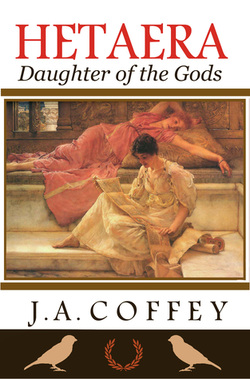
* * * *
I was provided a copy of this book through Goodreads’ READ IT AND REAP program in exchange for my fair and honest review. I thank the author for providing me with this opportunity.
In Hetaera, we follow Doricha from her early days as a child in Thrace, through her years of slavery, to her rise to fame as Rhodopis, then finally, to the very throne of Egypt. I was engaged in the story from the outset, as Doricha witnesses her father’s death during an invasion of her village by the Greeks. Doricha is thereafter driven to follow her father’s last words and wishes for her: LIVE FREE!
I will say at the outset that it was a pleasure to read a book that was so well done in the sense of proper grammar and punctuation and so forth. While there were a few—there were only a few such mistakes or editing errors. This made for a smooth and easy read. In this regard, I have just one “criticism” really and that was about those things intended to be italicized that showed in my e-copy as underlined. I also have a question about timing. When Doricha becomes a slave, the sense of the number of year that pass seems confused. . . .
There were some very adult situations. But for those, I would have recommended Hetaera to my daughters. Even so, it seems these scenes were used to show the unique world that was ancient Greece and its surrounds and not necessarily for their “erotica-effect.”
I appreciated Coffey’s word choices and word-pictures. She successfully brought me to each place, engaging my senses not just of sight, but also of sound, smell, taste and touch.
Coffey successfully created full and interesting characters—including those whose presence was short lived: Doricha’s strong father; her persevering and sacrificing mother; the jealous and hateful Aidne; the concerned Meriko; the helpful, old Samothraki slave; and so forth. They were, each and all, believable. Having said that, while I felt sorry for Doricha through much of the story, I did not particularly like her. I cannot say why that was. She just didn’t pull at my heartstrings—notwithstanding her circumstances. Another main character that was very interesting was Aesop. I especially liked that he was included in the story—but again, I did not particularly like him.
Well done, Coffey!
For more information on J. A. Coffey and Hetaera, see here.


